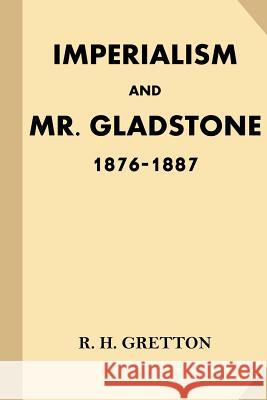Imperialism and Mr. Gladstone: 1876-1887 » książka
Imperialism and Mr. Gladstone: 1876-1887
ISBN-13: 9781539759447 / Angielski / Miękka / 2016 / 274 str.
Imperialism and Mr. Gladstone: 1876-1887
ISBN-13: 9781539759447 / Angielski / Miękka / 2016 / 274 str.
(netto: 56,74 VAT: 5%)
Najniższa cena z 30 dni: 55,71 zł
ok. 13-18 dni roboczych
Dostawa przed świętami

Darmowa dostawa!
Originally published in 1913, Imperialism and Mr. Gladstone: 1876-1887 chronicles the history of Great Britain, in the years 1876 to 1887, during which the prime ministership was mostly held, in separate occasions, by Mr. William Ewart Gladstone, a British liberal.
EXCERPT FROM THE BOOK:
INTRODUCTION
This series of English History Source Books is intended for use with any ordinary textbook of English History. Experience has conclusively shown that such apparatus is a valuable-nay, an indispensable-adjunct to the history lesson. It is capable of two main uses: either by way of lively illustration at the close of a lesson, or by way of inference-drawing, before the textbook is read, at the beginning of the lesson. The kind of problems and exercises that may be based on the documents are legion, and are admirably illustrated in a History of England for Schools, Part I., by Keatinge and Frazer, pp. 377-381. However, we have no wish to prescribe for the teacher the manner in which he shall exercise his craft, but simply to provide him and his pupils with materials hitherto not readily accessible for school purposes. The very moderate price of the books in this series should bring them within reach of every secondary school. Source books enable the pupil to take a more active part than hitherto in the history lesson. Here is the apparatus, the raw material: its use we leave to teacher and taught.
Our belief is that the books may profitably be used by all grades of historical students between the standards of fourth-form boys in secondary schools and undergraduates at Universities. What differentiates students at one extreme from those at the other is not so much the kind of subject-matter dealt with, as the amount they can read into or extract from it.
In regard to choice of subject-matter, while trying to satisfy the natural demand for certain "stock" documents of vital importance, we hope to introduce much fresh and novel matter. It is our intention that the majority of the extracts should be lively in style-that is, personal, or descriptive, or rhetorical, or even strongly partisan-and should not so much profess to give the truth as supply data for inference. We aim at the greatest possible variety, and lay under contribution letters, biographies, ballads and poems, diaries, debates, and newspaper accounts. Economics, London, municipal, and social life generally, and local history, are represented in these pages.











